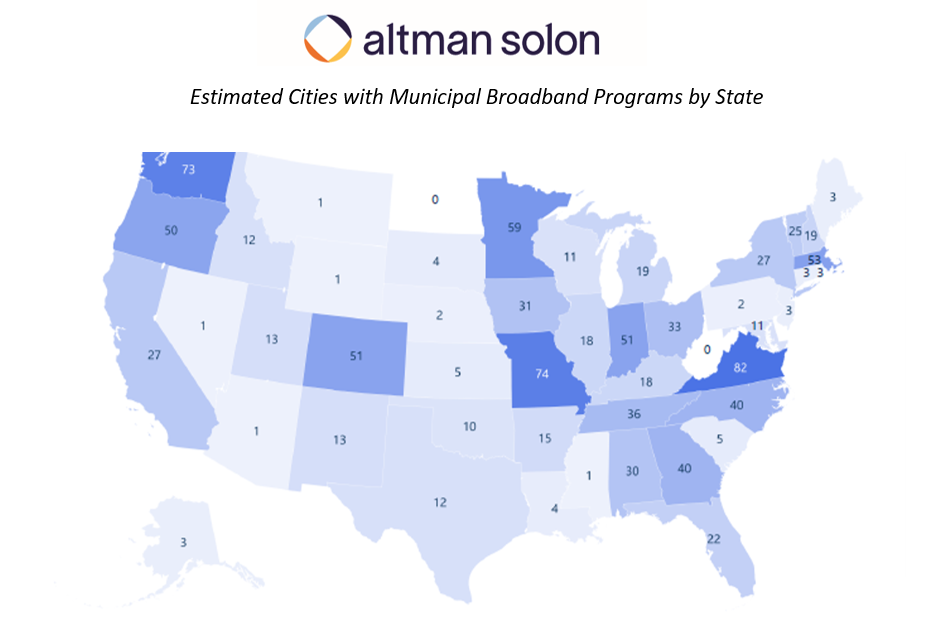Report highlights role of municipal enablement and growing popularity of hybrid deployment models
WASHINGTON, D.C. – July 9, 2020 – US Ignite and Altman Solon are pleased to announce the results of a comprehensive study of municipally enabled broadband deployment in a new report: Broadband Models for Unserved and Underserved Communities. The report aims to help any of the estimated 6,5001 unserved or underserved communities evaluate their options for broadband connectivity and weigh the opportunities and risks of public, private, and hybrid networks.
Ninety-two percent of municipalities in the United States that are considered well-served with broadband Internet rely entirely on private network service providers, according to the Broadband Models report. However, the other eight percent have implemented a range of municipally enabled deployments and offer case study examples of alternative network models. Most of the communities in this smaller group fully own and operate their own municipal broadband networks. Nonetheless, there is growing support for hybrid public-private deployments and evidence that hybrid solutions may offer a viable approach for some communities lacking sufficient broadband coverage.

“Communities have traditionally looked at broadband deployment as an either/or proposition; either depending solely on the private sector for Internet service, or deciding to invest in broadband networks that are publicly owned and operated,” said Charles Cieutat, Partner at Altman Solon. “Particularly in smaller or more rural communities, however, there is growing interest in hybrid models and public-private partnerships. In these scenarios, risk and reward are shared, with decision making based on a community’s demographics, existing infrastructure, and available funding sources.”
The Broadband Models report examines five specific network and service model options differentiated along a value chain of asset ownership and broadband delivery:
- Full municipal broadband – Most prevalent public model; city can use local utility or other public entities; representative case study features Chattanooga, Tennessee
- Publicly-owned, privately-serviced – Popular model, reduces operational risk (no retail relationship); representative case study features Westminster, Maryland
- Hybrid ownership – Asset split between private and public parties; representative case study features Lincoln, Nebraska
- Private developer open access – Common in Europe and rare in the US, but increasing interest recently; representative case study in Fullerton, California
- Full private broadband – Municipality is only lightly engaged, enabling a private party to build out the network and provide service; representative case study in Boston, Massachusetts
In preparing the Broadband Models report, analysts from Altman Solon studied existing data from MuniNetworks.org, a site created and maintained by the Community Broadband Networks Initiative of the Institute for Local Self-Reliance, as well as broadband service data collected by the Federal Communications Commission. In addition, the report’s authors conducted detailed secondary research across 35 cities, and interviewed numerous municipal officials, industry experts, and local leaders.
“Communities and federal agencies are investing significant resources to close broadband gaps and keep students and businesses connected during a global health crisis,” said Joe Kochan, Chief Executive Officer of US Ignite. “We believe that in the wake of the pandemic, communities will build on that momentum, and that the availability of detailed economic and operational data will be critical for local governments seeking long-term, sustainable solutions for connectivity. It’s our hope that the new Broadband Models report will be a valuable resource in that process.”
For a whitepaper with analysis of the Broadband Models report, please see our published copy on the US Ignite website. For a copy of the full report and case studies, please contact Lee Davenport, Director of Community Development at US Ignite.
Further resources for smart and connected communities, including COVID-19 response strategies and federal funding opportunities, are also available on the US Ignite website.
1The 6,500 underserved/unserved cities were determined based on analysis of Form 477 data and MuniNetworks.org. This number includes cities where at least 50% of the city does not have access to 250+ Mbps broadband.
###
About US Ignite
US Ignite is a high-tech nonprofit with a mission to accelerate the smart community movement. We work to guide communities into the connected future, create a path for private sector growth, and advance technology research that’s at the heart of smarter development. For more information, visit www.us-ignite.org.
About Altman Solon
Altman Solon is a global strategy consulting firm that works across the Telecommunications, Media, and Technology (TMT) sectors. Our consultants are united by passion and intellectual curiosity for TMT and work with market leaders, challenger brands, and investors in these industries.
Altman Solon was formed following a merger between Altman Vilandrie & Company and Solon Management Consulting in 2020, cementing a decade-long partnership across the Atlantic to form the world’s largest global strategy consulting firm with an exclusive focus on the TMT sectors.
Altman Solon has extensive international reach with around 300 employees based in Boston, London, Milan, Munich, New York, Paris, San Francisco, and Warsaw, with successful projects completed across more than 100 countries.
For further information, please visit www.altmansolon.com.

